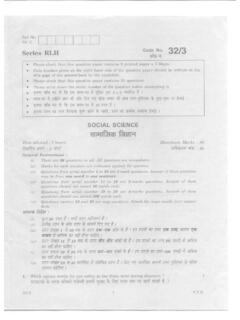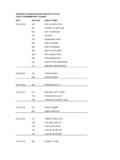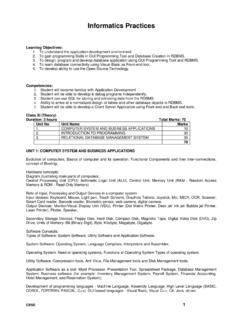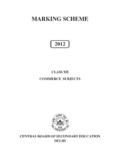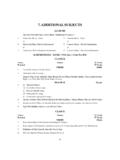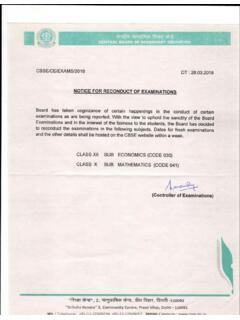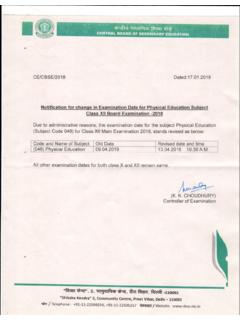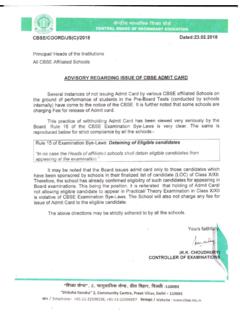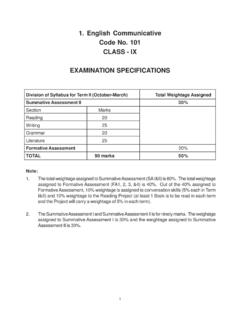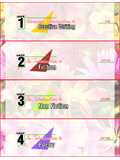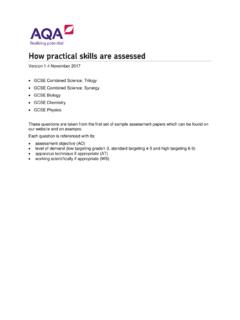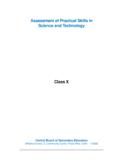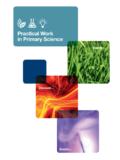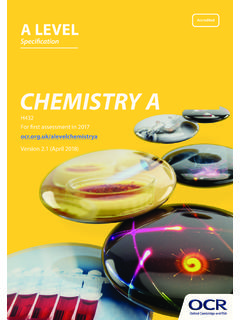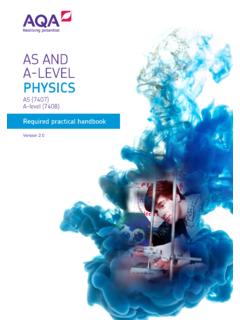Transcription of Assessment of Practical Skills in Science
1 1 Assessment ofPractical Skills in ScienceClass X(Effective from March, 2009 Examination)Central Board of Secondary EducationShiksha Kendra, 2, Community Centre, Preet Vihar, Delhi 1100922 CBSE, Delhi - 110092 Revised Edition:July, 2008No. of Copies :PricePublished by :The Secretary, CSBSE, Shiksha Kendra ,2, Community Centre, Preet Vihar, Delhi - 110092 Designed by :Multi Graphics, 5745/81, Regharpura, Karol : 25783846 Printed by :3 Hkkjr dk lafo/kkum sf'kdkge] Hkkjr ds yksx] Hkkjr dks ,d izHkqRo&laiUu lektoknh iaFkfujis{k yksdra=kRed ; cukus ds fy, rFkk mlds leLr ukxfjdksa dks %lkekftd] vkfFkZd vkSj jktuSfrd U;;]fopkj] vfHkO;fDr] fo'okl] /keZvkSj mikluk dh Lora=krk]izzfr"Bk vkSj volj dh lerkizkIr djkus ds fy,]rFkk mu lc esaO.}
2 FDr dh xfjek vkSj2 jk"V dh ,drk vkSj v[ lqfuf'pr djus okyh ca kqrk c<+kus ds fy,n`<+ladYi gksdj viuh bl lafo/kku lHkk esa vkt rkjh[k 26 uoEcj]] 1949 bZ dks ,rn~}kjk bl lafo/kku dksvaxhd`r] vf kfu;fer vkSj vkRekfiZr djrs gSaA1-lafo/kku c;kyhloka la'kks/ku vf/kfu;e] 1976 dh /kkjk 2 }kjk 3-1-1977 ls izHkqRo&laiUu yksdra= ; ds LFkku ij izfrLFkkfirA2-lafo/kku c;kyhloka la'kks/ku vf/kfu;e] 1976 dh /kkjk 2 }kjk 3-1-1977 ls jk"V dh ,drk ds LFkkuij izfrLFkkfirAHkkx 4 dewy d kZO;5-1d- ewy d kZO;& Hkkjr ds izR;sd ukxfjd dk ;g d kZO; gksxk fd og& d lafo/kku dk ikyu djs vkSj mlds vkn'kks ] laLFkkvksa] jk"V /ot vkSj jk"V xku vknj djsa( [k Lora=rk ds fy, gekjs jk"V h; vkanksyu dks izsfjr djus okys mPp vkn'kks dks n; esa latks,j[ksa vkSj mudk ikyu djsa( x Hkkjr dh izHkqrk] ,drk vkSj v[kaMrk dh j{kk djsa vkSj mls v{ j[ksa( ?)))
3 K ns'k dh j{kk djsa vkSj vk oku fd, tkus ij jk"V dh lsok djsa( Hkkjr ds lHkh yksxksa esa lejlrk vkSj leku Hkzkr`Ro dh Hkkouk dk djsa tks /keZ] Hkk"kk vkSjizns'k ;k oxZ ij vk/kkfjr lHkh HksnHkko ls ijs gksa] ,slh izFkkvksa dk R;kx djsa tks fL=k;ksa ds lEekuds fo#) gSa( p gekjh lkekftd laLd`fr dh xkSjo'kkyh ijaijk dk egRo le>sa vkSj mldk ifjj{ djsa( N izkd`frd i; dh ftlds varxZr ou] >hy] unh vkSj oU; tho gSa] j{kk djsa vkSj mldklao/kZu djsa rFkk ek=k ds izfr n;kHkko j[ksa( t oSKkfud n`f" ] ekuookn vkSj KkuktZu rFkk lq/kkj dh Hkkouk dk fodkl djsa( > lkoZtfud laifRr dks lqjf{kr j[ksa vkSj fgalk ls nwj jgsa( O;fDrxr vkSj lkewfgd xfrfof/k;ksa ds lHkh {ks=ksa esa mRd"kZ dh vksj c<+us dk lrr iz;kl djsaftlls jk"V fujarj c<+rs gq, iz;Ru vkSj miyfC/ dh ubZ pkbZ;ksa dks Nw ysaA4 THE CONSTITUTION OF INDIAP reambleWe, The people of India, having solemnly resolved to constitute India into a1(Sovereign Socialist Secular democratic republic) and to secure to all itscitizens :Justice, Social, Economic and Politicial;Liberty of thought, expression, belief, faith and worship;Equiality of status and of opportunity; and to promote among them allFraternity assuring the dignity of the individual and the2 (unity and integrity of theNation).)))))}}}}}
4 In our Constitutent Assembly this twenty-sixth day of November, 1949, do herebyadopt, enact and give to ourselves this by the Constitution (Forty-second Amendment) Act, 1976, sec. 2, for"Sovereign Democratic Republic ( )". by the Constitution (Forty-second Amendment) Act, 1976, sec. 2, for "Unityof the Nation ( )".THE CONSTITUTION OF INDIAC hapter IV AFundamental DutiesArticle 51-AFundamental Duties It shall be the duty of every citizen of India-(a)to abide the Constitution and respect its ideals and institutions, the National Flagand the National Anthem;(b)to cherish and follow the noble ideals which inspired our national struggle forfreedom;(c)to uphold and protect the sovereignty, unity and integrity of India;(d)to defend the countlry and render national service when called upon to do so.
5 (e)to promote harmony and the spirit of common brotherhood amongst all the peopleof India transcending religious, linguistic and regional or sectional diversities; torenounce practices derogatory to the dignity of women;(f)to value and preserve the rich heritage of our composite culture;(g)to protect and improve the rich natural environment including forests, lakes, rivers,wild life and to have compassion for living creatures;(h)to develop the specific temper, humanism and the spirit of inquiry and reform;(i)to safeguard public property and to abjure violence;(j)to strive towards excellence in all spheres of individual and collective activity sothat the national constantly rises to higher levels of endeavour and of ExperimentsCategories of Practical SkillsDesign of Question PaperSample Question Paper IScoring Key - ISample Question Paper IIScoring Key - IISample Question Paper IIIS coring Key IIIA cknowledgements56912141628304244565867 FOREWORDThe central role of experiments and Practical work in school sciencecurriculum is universally accepted.
6 A balanced Science curriculum should notonly give due emphasis to both theory and experiments, but also integratethese complimentary aspects of the subject in teaching-learning Science , as we all know, is the result of creative interplay ofobservations, experimentation and theoretical importance of Practical work in Science education has also been recognizedand greatly emphasized in national policy of education for the past severaldecades. However, despite several laudable efforts in the past, experiments,by and large, have continued to be marginalized in the schools. The challengearises due to combination of several factors.
7 The Board has been keen to findout ways to promote laboratory work in the subject and introduce greateruniformity, objectivity and reliability in the Assessment of Practical work. Withthe objective of strengthening experimentation and Skills through a writtentest also as part of its evaluation procedure in class IX during 2005-2006. Thescheme was extended to class X from the academic session 2006-07 onwards. Itis hoped that this initiative given experiments their due place in subject andhas promoted, an experimental culture in our school system. The presentdocuments includes questions based on experiments included in class IX aswell as class X Practical syllabus and has been thoroughly shall put on record my heartfelt and sincere thanks to Homi BhabhaCentre for Science Education, Bombay for extending its full academic expertiseand providing all necessary facilities for development of this material duringtwo six-day workshops organized by the Board at the centre.
8 The immenselyrich and creative contribution made to the development and finalization ofthis material by Prof. Arvind Kumar, Director, HBCSE is gratefullyacknowledged. The honest efforts put in by Prof. Chitra Natrajan, Prof. , Mr. Gambhir and other faculty members of the centre andthankfully acknowledged. Sincere thanks are also due to other eminent subjectexperts from IGNOU, Delhi University, School Systems in Delhi and Chennaiwho worked hard and made rich contributions to the development of thismaterial. My deep appreciation and thanks are also due to Shri , Director (Academic), CBSE and Shri Sharma, EducationOfficer ( Science ), for putting in their best efforts in designing of this materialand publication of this is hoped that concerted efforts will be put in by all schools and subjectteachers to make best use of this document and make learning of Science ajoyful and meaningful experience for and suggestions from readers for further improvement ofthis document will be highly JOSHI, crucial role of experiments in school Science curriculum is universally accepted.
9 A goodscience curriculum must not only give balanced emphasis to both theory and experiments butalso integrate these two essential and complementary aspects of Science in the teaching-learning process. Modern Science , as we all know, is the result of a creative interplay ofexperiments, observations and theoretical are several ways in which experiments facilitate and improve the learning of and foremost, experiments help students develop the right perspective of Science , namelythat Science is not just a theoretical abstraction it is an attempt to describe the working of thereal world around us. A hypothesis or idea in Science is acceptable only if observations andexperiments confirm it.
10 Second, experiments are among the most effective ways to generateinterest in Science . For many students, an apparently dry , uninteresting fact of a theorytextbook can become live and exciting when translated into an experiment. Third, experimentspromote the basic Skills and competencies of doing Science : procedural and manipulativeskills, observation Skills , Skills of representing and interpreting data and the accompanyingconceptual and critical abilities. For these various reasons, promoting activity and experimentbased learning has been at the heart of many efforts aimed at improving Science education inour several laudable efforts in the past, experiments, by and large, have continued to bemarginalized in our schools.
